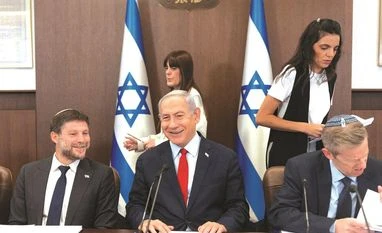Israel’s nationalist-religious government on Sunday tabled plans to approve thousands of building permits in the occupied West Bank, despite US pressure to halt settlement expansion that Washington sees as an obstacle to peace with Palestinians.
The plans for approval of 4,560 housing units in various areas of the West Bank were included on the agenda of Israel’s Supreme Planning Council that meets next week, although only 1,332 are up for final approval, with the remainder still going through the preliminary clearance process.
“We will continue to develop the settlement of and strengthen the Israeli hold on the territory,” said Finance Minister Bezalel Smotrich, who also holds a defence portfolio that gives him a leading role in West Bank administration.
Most countries deem the settlements, built on land captured by Israel in the 1967 Middle East war, as illegal. Their presence is one of the fundamental issues in the Israeli-Palestinian conflict.
Palestinians seek to establish an independent state in the West Bank and Gaza Strip with East Jerusalem as their capital. Peace talks that had been brokered by the United States have been frozen since 2014.
Intel Corp will build a new factory in Israel worth $25 billion, Prime Minister Benjamin Netanyahu said on Sunday, calling it the largest-ever international investment in the country. The factory in Kiryat Gat is due to open in 2027 and will employ thousands of people, Israel's Finance Ministry said, adding that under the deal Intel will pay up a 7.5 per cent tax rate, up from the current 5 per cent.
Judicial overhaul on cards
More From This Section
Israeli Prime Minister Benjamin Netanyahu said Sunday his government intends to move ahead on contentious plans to change the country's judicial system after talks aimed at finding a compromise solution appeared to be crumbling.
The government’s plans to overhaul the judiciary plunged Israel into one of its worst domestic crises ever earlier this year.
Negotiations between the government and opposition parties somewhat alleviated the crisis with attempts to find a middle ground over proposed changes to the country’s justice system.
Those talks were jolted last week over a crisis surrounding the powerful regular committee responsible for picking the country’s judges.
)